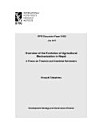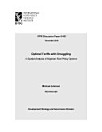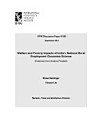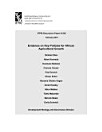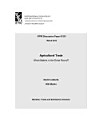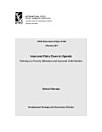Reverse-Share-Tenancy and Marshallian Inefficiency: Landowners Bargaining Power and Sharecroppers Productivity
Hosaena Ghebru Hagos · Stein T. Holden
מאי 2013 · IFPRI Discussion Paper ספר 1 · Intl Food Policy Res Inst
ספר דיגיטלי
48
דפים
family_home
כשיר
info
reportהביקורות והדירוגים לא מאומתים מידע נוסף
מידע על הספר הדיגיטלי הזה
While there are ample empirical studies that claim the potential disincentive effects of sharecropping arrangements, the existing literature is shallow in explaining why share tenancy contracts are prevalent and diffusing in many developing countries. Using a unique tenant-landlord matched dataset from the Tigray region of Ethiopia, we are able to show how the tenants strategic response to the varying economic and tenure-security status of the landlords can explain sharecroppers productivity differentials. To the best of our knowledge, this is the first study to use tenantlandlord matched data that accounts for both the supply (landlord) and demand (tenant) side characteristics in analyzing sharecroppers level of effort and productivity. The study reveals that sharecroppers yields are significantly lower on plots leased from landlords who are non-kin, who are female, who have lower income-generating opportunity, and who are tenure insecure than on plots leased from landlords with the opposite characteristics. While, on aggregate, the results show no significant efficiency loss on kin-operated sharecropped plots, more decomposed analyses indicate strong evidence of Marshallian inefficiency on kin-operated plots leased from landlords with weaker bargaining power and higher tenure insecurity. This study thus shows how failure to control for the heterogeneity of landowners characteristics can explain the lack of clarity in the existing empirical literature on the extent of moral hazard problems in sharecropping contracts.
רוצה לדרג את הספר הדיגיטלי הזה?
נשמח לשמוע מה דעתך.
איך קוראים את הספר
סמארטפונים וטאבלטים
כל מה שצריך לעשות הוא להתקין את האפליקציה של Google Play Books ל-Android או ל-iPad/iPhone. היא מסתנכרנת באופן אוטומטי עם החשבון שלך ומאפשרת לך לקרוא מכל מקום, גם ללא חיבור לאינטרנט.
מחשבים ניידים ושולחניים
ניתן להאזין לספרי אודיו שנרכשו ב-Google Play באמצעות דפדפן האינטרנט של המחשב.
eReaders ומכשירים אחרים
כדי לקרוא במכשירים עם תצוגת דיו אלקטרוני (e-ink) כמו הקוראים האלקטרוניים של Kobo, צריך להוריד קובץ ולהעביר אותו למכשיר. יש לפעול לפי ההוראות המפורטות במרכז העזרה כדי להעביר את הקבצים לקוראים אלקטרוניים נתמכים.

